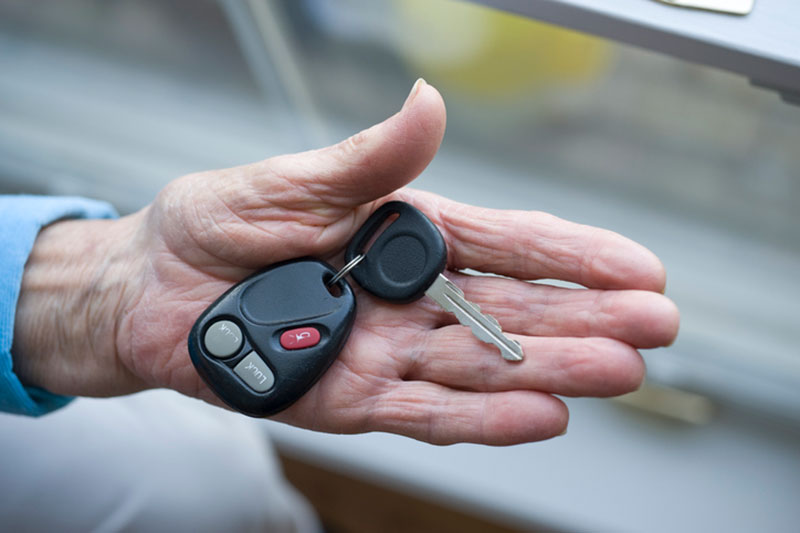
When seniors stop driving, they may fear the loss of independence, but home care services can help them continue with an active lifestyle.
It’s a conversation no one wants to have with aging parents, but one that will probably be required at some point. Having the ability to drive wherever and whenever we wish is a key component to our feeling of freedom, yet as we get older, driving can become unsafe for a number of reasons: decreased reflex and response times, cognitive problems, poor vision, and more. If you are starting to have worries about a senior loved one’s ability to continue to drive safely, it is time for a conversation about giving up the keys, and how to maintain independence when seniors stop driving.
How Will You Know That It’s Time for a Senior to Stop Driving?
There are a few red flags to watch for that point to the necessity for a senior to stop driving, including:
- Becoming lost on familiar driving routes
- Missing traffic signals or signs
- Not yielding or cutting off other drivers
- Making wider turns than necessary
- An inability to stay between the lines
- Appearing to be inattentive or sleepy
- Having trouble judging distances
- Becoming frustrated, angry, or agitated
- Not using turn signals or mirrors properly
How Can You Initiate the Conversation About Giving Up the Keys?
Above all, try to avoid correcting or criticizing the senior’s errors while they are driving, because this can cause further hazardous behaviors. Once the car is parked, calmly describe specific instances of concern that you witnessed as a starting point to the larger conversation about the need for the person to stop driving.
To move the conversation forward, use the following tips to make sure you are being heard and taken seriously. Use the conversation to reduce the senior’s stress and to provide a solution that will empower the individual to maintain independence.
Key Points to Keep in Mind:
- Recruit help from others that the senior knows and trusts, either in offering their own instances of concerns or perhaps in joining you for the conversation.
- Avoid shaming or blaming the senior.
- Keep your temperament relaxed and encouraging so that you do not appear angry.
- Discuss specific instances of worrisome behaviors.
- Let the person know you are in this together, and that together you will come up with an answer that ensures safety for the senior as well as other drivers and pedestrians.
- Anticipate opposition and defensiveness, and that it may take multiple conversations.
If the older adult remains adamant about not stopping driving, schedule a checkup and consultation with the doctor. There may be medication side effects, vision problems, or other health-related reasons behind driving difficulties that can be corrected; or the physician may have more influence in convincing the person to give up the keys.
When Seniors Stop Driving, How Can They Stay Independent?
Thankfully, there is a simple solution that allows an older adult to come and go as they wish: a professional in-home care provider from Anthem Home Care, the experts in dementia care in Portland, TX and the surrounding areas.
When seniors stop driving, our caregivers are available to provide transportation and accompaniment whenever and wherever a senior wants to go, including:
- Medical appointments and procedures
- Running errands and shopping
- Social visits
- Going out to lunch or for a walk in the park
- Hair and nail appointments
- Exercise or any other classes
Even vacations or longer-destination outings
The best part? A care provider can provide friendly companionship and conversations that make any outing a lot more enjoyable than going alone!
Reach out to our experts in home and dementia care in Portland, TX and throughout the surrounding areas at 361-643-2323 to ask about our transportation services for seniors and help a senior you love live their best life, safely and happily.
